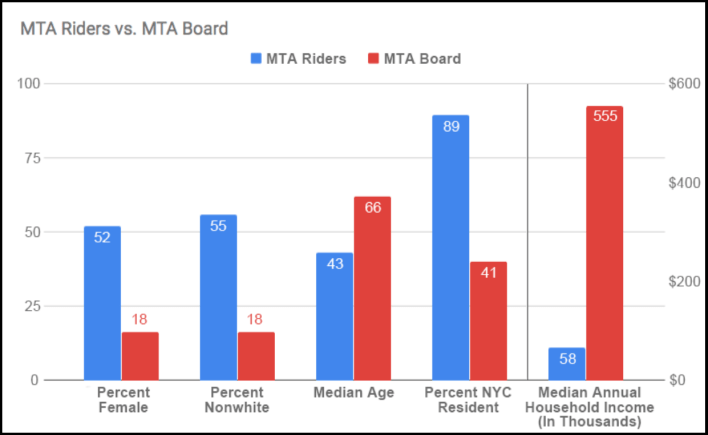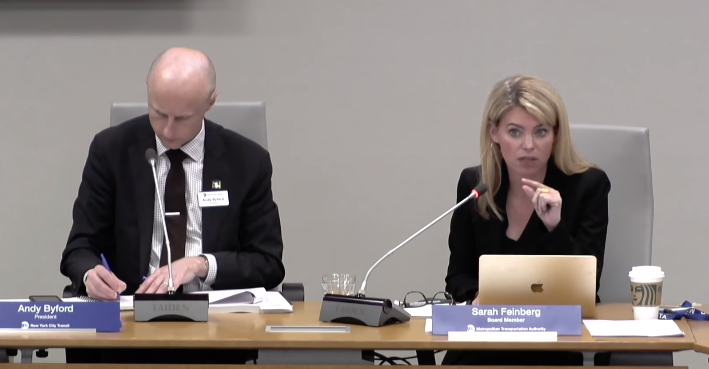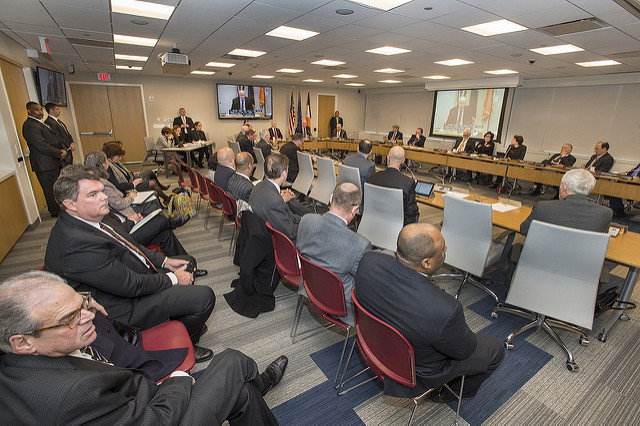They're rich. They're white. They don't live in the city.
The future of New York City's transit system is in their hands.
They're the 17 members of the MTA board. And a new analysis from government watchdog Reinvent Albany charges that they're out of touch with riders — and seemingly uninterested in changing that [PDF].

The group crunched the numbers and they are nothing short of scandalous: 89 percent of MTA riders live in New York City, but only 41 percent of MTA board members live in the five boroughs. The average board member's income was nearly 10-times that of the average rider. Yet the last time the agency released any ridership demographic data was in 2008.
“When you have a board that isn’t representative of the ridership, it’s no wonder that they haven’t prioritized getting an accurate and transparent assessment of who’s riding transit and what the needs are that aren’t being addressed by the current system," said Ben Fried of TransitCenter, which funded the Reinvent Albany study.
The good government group's report recommends that the agency collect and publicly release demographic data related to age, income, race, ethnicity, gender, profession, disability, and geography — all of which help inform various aspects of its operations.
The problem, according to Fried and other transit analysts, is not necessarily that the data doesn't exist, but that the MTA fails to make use of it. Rider demographic data is rarely referenced when making case for controversial projects. Board members make decisions and set priorities without considering the needs or concerns of riders. And the MTA has little idea how its customers actually feel about the system — its customer surveys merely measure ask riders once whether they are satisfied with various aspects of service.
“Ridership demographic data matters because presumably MTA is basing policy and service decision on these findings," said Sarah Kaufman, associate director of the NYU Rudin Center for Transportation. She cited the connections between ethnicity data and providing translation services, gender data and safety questions, and income data and fare policies.
The 2008 data, for example, as well as data obtained by Streetsblog two years later, helped reshape the public discussion about the subway's single-ride options. Since then, the MTA has emphasized keeping the base fare steady even as the cost of weekly and monthly Metrocards increase, since the poor are more likely to pay per ride.
The demographics of the board are changing thanks to the recent replacement of a number of wealthy white men with women and people of color. But board members are unpaid, which limits participation to people who have time to spare. As a result, they tend to be well-connected people with high-paying day jobs, like outgoing members Peter Ward, Charles Moerdler, and Scott Rechler, or continuing Finance Chair Larry Schwartz.
All four are white men appointed by Gov. Cuomo. Ward is the powerful president of the Hotel Trades Council, Moerdler an attorney who was more than once spotted abusing his parking placard to illegally park his Mercedes. Rechler is a real estate developer and Cuomo supporter who serves as president of the Regional Plan Association. Schwartz was previously Cuomo's top aide and is now an airport concessions executive; notably, he recently conceded that he wasn't familiar with how fares are collected on city buses.
Yet the new crop of board members doesn't appear to be significantly more representative: new appointees include the former C.E.O. of Sony, a Long Island business group leader, the Mets' external affairs chief, and a former Obama administration transportation official who spent most of her career in D.C.

Recent board conversations about fare evasion highlight the shortcomings in the MTA's approach to public data: After getting an earful at fare hike hearings about turnstile-jumpers, board members pressed the MTA to take a proactive stance — and transit officials responded by calling for increased police presence at subway stations and on buses. But the MTA's data was specious — based on visual survey of key routes and stations, then extrapolated for the entire system. The agency hasn't released any breakdowns by borough, route or demographics.
"In order for people to trust what the MTA is saying, they actually have to tell people how they are conducting these studies of fare evasion," Fried said. “They release data ad hoc as it serves the purposes of the moment for the agency. They should be releasing a well-defined set of data about their ridership on a regular basis — that’s not bound to the news cycle, that’s just in the service of informing the public.”






